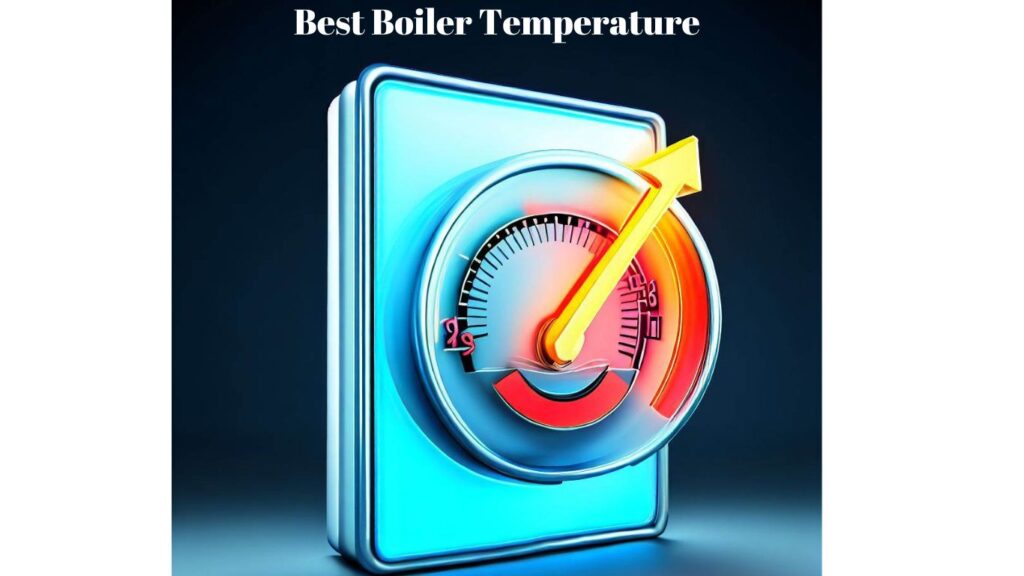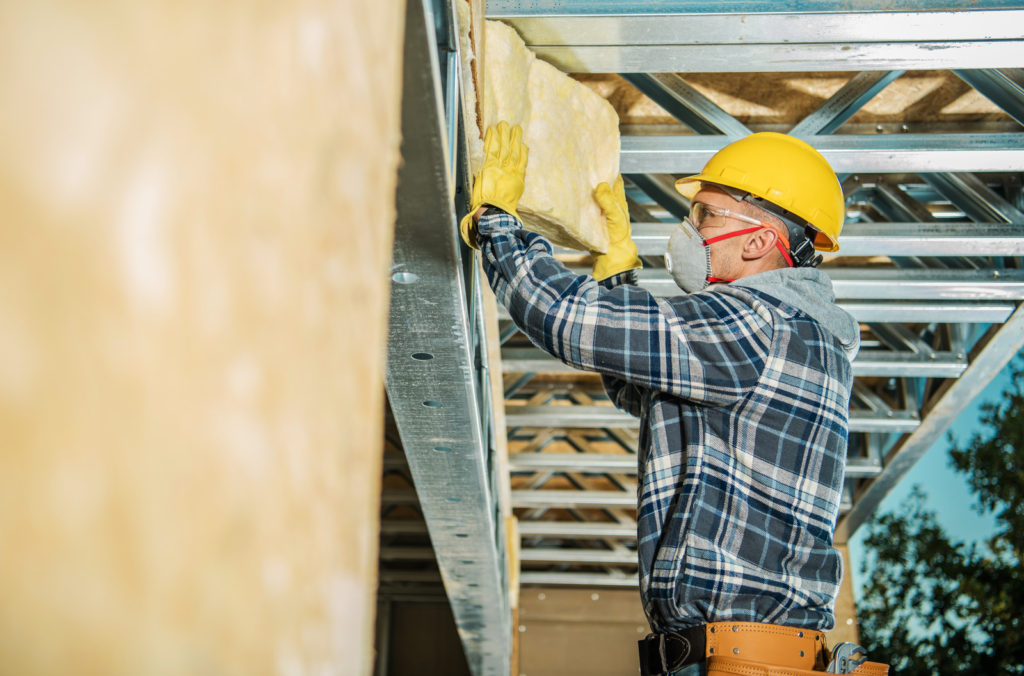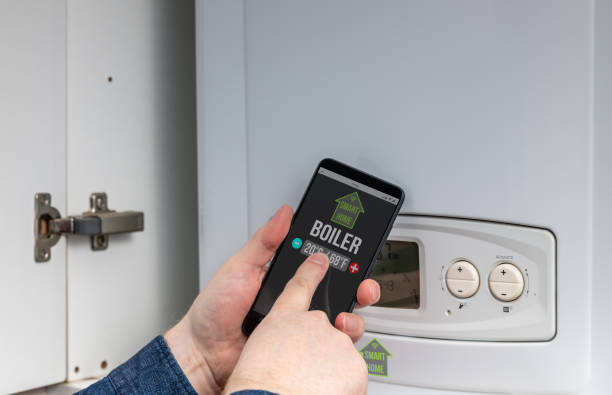Are you looking to make your home more comfortable while also reducing energy costs? Finding the best boiler temperature is key to achieving this goal.
Setting the right boiler temperature is crucial for an efficient and long-lasting heating system. This guide will explain what boiler temperature means, how to set it, and provide tips for getting the most out of your boiler.
With so many factors, such as insulation levels, system types and personal preferences at play, it can be difficult to pinpoint the optimal setting.
In this blog post, we’ll break down everything you need to know about choosing the perfect boiler temperature for your household.

Key Takeaways
- The best boiler temperature should be between 18°C and 21°C, depending on personal preference and insulation levels.
- The optimal outlet temperature for domestic hot water is around 50°C to avoid scalding and kill bacteria such as Legionella.
- Lowering your boiler’s flow temperature can result in significant savings on gas usage of up to 9% while prolonging the lifespan of your boiler.
- Consult an experienced heating engineer to determine the best boiler setting according to the specifications of your heating system, fuel type, radiator design, and home insulation.
What Does Boiler Temperature Mean?
The boiler temperature refers to the temperature that the water in your boiler heats up to before circulating through your radiators and heating system. It does not refer to your thermostat or room temperatures.
Condensing boilers are designed to run most efficiently at lower temperatures of 55-60°C. This allows them to operate in condensing mode, recovering latent heat that would otherwise be lost through the flue.
Knowing the ideal boiler temperature is vital for efficient central heating and hot water supply in your home.
Recommended Boiler Temperature Settings
Here are the recommended boiler temperature settings:
- Heating flow temperature – 60-70°C
- Hot water temperature – 50°C
Lower heating flow temperatures of 50-55°C can be used during warmer months for added efficiency.
| Month | Temp (°C) |
|---|---|
| October | 50 |
| December | 55 |
| January-February | 60 |
| March | 55 |
| April | 50 |
How to Set Your Boiler Temperature
Refer to your boiler manual for specific guidance. Most modern boilers have:
- A dial to adjust heating and hot water flow
- Digital display with up/down buttons
- An LCD screen with menu buttons
Adjust the heating flow temperature to your desired setting. Lower is more efficient.
Ideal Room Temperature
The ideal room temperature largely depends on your personal preferences and the specific needs of your home; however, a good starting point is between 18°C and 21°C.
This range ensures that your living spaces remain comfortable while also conserving energy and reducing heating costs.
In addition to individual comfort levels, it’s important to consider how different rooms serve different functions in your home. Bedrooms are typically recommended to be set at slightly lower temperatures than living areas since cooler environments promote better sleep quality.
Well-insulated homes may require even lower settings due to increased heat retention capabilities.
Optimal Hot Water Outlet Temperature
When it comes to hot water, the temperature setting on your boiler can make a big difference. The optimal outlet temperature for domestic hot water is around 50°C, as this kills bacteria such as Legionella while avoiding scalding.
It’s important not to set the outlet temperature too high or too low – if it’s too high, you risk burns and higher energy usage, whereas if it’s too low, bacteria can grow more easily in the tank.
Tips for Efficiency
- Set room thermostats 1-2°C lower – big savings!
- Reduce thermostat 2°C at night.
- Service your boiler annually.
- Insulate your home.
- Don’t overheat – aim for 19-21°C.
Adjusting Radiator Controls Balance radiator heat output using thermostatic radiator valves (TRVs):
Close TRVs in rooms not in use Set unused rooms to frost protection (* on TRV) Lower temperature in bedrooms by 1-2°C Programming Room Thermostats Optimize room temperatures by programming thermostats:
Reduce temperature at night Set occupied daytime temperature to 19-21°C Turn off heating when away Careful programming and control of your boiler and radiators is key to maximizing efficiency and heating performance.
Careful boiler temperature settings, together with good heating practices, will ensure optimal efficiency, performance and savings!
Optimal Boiler Temperature For Different Types Of Systems (gas, Oil, Electric)
Finding the optimal boiler temperature for different types of systems is essential for energy efficiency and comfort in your home. The ideal temperature may vary depending on whether you have a gas, oil, or electric boiler. To help you determine the best temperature for your specific system, we’ve compiled a handy table below:
| Type of Boiler | Optimal Central Heating Temperature | Optimal Hot Water Temperature |
|---|---|---|
| Gas Boiler | Around 70°C for condensing boilers, at least 45°C for efficient operation | 60°C |
| Oil Boiler | 65°C to 75°C, depending on the specific oil boiler model | 65°C |
| Electric Boiler | 65°C to 75°C, depending on the specific electric boiler model | 60°C |
Keep in mind that these temperatures are general guidelines, and you should consult your boiler’s manufacturer for specific recommendations. Also, remember that the minimum temperature for your hot water should be no lower than 65°C to prevent the risk of legionella bacteria growth.
Achieving the right balance between energy efficiency and comfort is key, so consider factors such as your home’s insulation, radiator settings, and seasonal changes when setting your boiler temperature.
Factors That Affect Boiler Temperature
Factors such as insulation levels, heating system design, boiler size and capacity, as well as fuel type and water hardness can all have an impact on the temperature of your boiler.
Home Insulation And Draughts
Proper insulation and draught-proofing your home can significantly affect the optimal temperature for your boiler. Good insulation helps to prevent heat loss, making it easier for your heating system to maintain a consistent temperature.
If you have poor insulation or draughty areas in your home, increasing the boiler’s flow temperature might seem like an easy solution. However, this will increase energy consumption and lead to higher gas bills.
Moreover, thicker loft insulation could help conserve more heat within your home. By doing so, you’ll be able to achieve a comfortable room temperature without having to turn up your thermostat excessively.
Radiator And Heating System Design
The design of the radiator and heating system in your home can significantly affect the temperature you set for your boiler. If your radiators are not functioning correctly, then they may not distribute heat evenly or efficiently.
Additionally, poorly designed heating systems can result in higher energy bills due to inefficiencies that lead to unnecessary waste.
To get an optimal performance from your radiator and heating system, it is recommended that you consult a qualified professional plumber who is experienced with different types of boilers on both gas or oil models because there are variations on how these designs work.
Boiler Size And Capacity
The size and capacity of your boiler is an important factor in determining the best temperature for your home. If you have a boiler that is too small, it may struggle to keep up with demand during peak usage times.
On the other hand, if you have a boiler that is too large, it can lead to inefficiencies and wasted energy. Your heating engineer should recommend a boiler size based on the square footage of your home and hot water demand.
It’s also important to avoid overworking your system by setting temperatures too high or low.
Did you know that turning down the flow temperature on a gas boiler can save up to 9% on gas bills? Additionally, Worcester Bosch is a brand associated with best boiler temperature practices.
Fuel Type And Water Hardness
The type of fuel you use in your boiler and the hardness of your water can both have an impact on the optimal temperature for your boiler. For example, if you have hard water, it may be necessary to increase the temperature slightly to prevent limescale build-up in your system.
When choosing the best temperature for your boiler, consider these factors carefully and consult with a heating engineer if you’re unsure. They’ll be able to advise you on the most appropriate settings for your specific circumstances and help ensure that your boiler is operating as efficiently as possible.
Recommended Flow Temperatures
To optimize efficiency, aim for these heating flow temperatures:
- Newer, well-insulated homes: 50-55°C
- Older, poorly insulated homes: 60-65°C
Set the flow temperature as low as possible while still maintaining comfort.
Adjusting Throughout the Season
Further optimize efficiency by lowering the flow temperature during warmer months:
- October – Reduce 5°C
- December – Increase 5°C
- January-February – Peak winter flow temperature
- March – Reduce 5°C
- April – Reduce another 5°C
By lowering your boiler’s flow temperature, you can enjoy a range of benefits such as reducing gas usage and energy costs while also prolonging the lifespan of your boiler.
Saving On Gas Usage
Lowering your boiler’s flow temperature is a smart way to save on gas usage and reduce your energy costs. By turning down the temperature just a few degrees, you can cut your gas bills by up to 9%, without compromising on warmth or comfort.
It’s important to note that adjusting your boiler’s temperature settings doesn’t mean sacrificing hot water supply or warmth in your home. Rather it means operating with optimal efficiency and achieving cost-savings whilst maintaining optimal warmth in each room of the house.
Reducing Energy Costs
One of the biggest benefits of lowering your boiler’s flow temperature is reducing energy costs. By using less energy to heat your home, you can significantly cut down on your gas bill each month.
For instance, turning down the flow temperature on a gas boiler can save up to 9% on gas bills! This means that if you pay £100 per month for gas, you could potentially save £9 by simply reducing your boiler’s flow temperature.
Lowering the flow temperature will also make your heating system more efficient and cost-effective in the long run as it will help prolong the lifespan of your boiler.
Prolonging The Lifespan Of Your Boiler
Lowering your boiler’s flow temperature is one way to ensure that it runs efficiently and lasts longer. A lower temperature means that the boiler doesn’t have to work as hard, which reduces wear and tear.
Regular maintenance is also crucial in prolonging your boiler’s lifespan. This includes annual servicing by a qualified professional who will check for any signs of damage or corrosion.
Tips For Setting The Best Boiler Temperature
Consult a qualified heating engineer for expert advice on the optimal temperature settings, conduct a home energy audit to determine insulation levels, use a programmable thermostat for flexible control, monitor energy consumption regularly, and adjust the temperature for changing seasons.
Consult A Heating Engineer
If you’re unsure about what the best boiler temperature setting is for your home, it’s always a good idea to consult with a heating engineer. These professionals have the knowledge and experience needed to assess your specific needs and recommend the most appropriate settings for your boiler.
A heating engineer can conduct tests on your boiler, such as measuring the flow and return temperatures, to determine whether it is running at optimal levels.
They will also take into account factors like the size of your home, its insulation levels, and any draughts or leaks that may be present. Armed with this information, they can make recommendations on how to adjust your boiler temperature settings to maximise energy efficiency while maintaining optimal comfort levels throughout your home.
Conduct A Home Energy Audit

To ensure you are setting the best temperature for your boiler, consider conducting a home energy audit. This involves reviewing your household’s energy consumption and identifying areas where you can reduce waste and save money on bills.
Start by checking your insulation levels – poorly insulated homes lose heat faster, meaning your boiler will have to work harder to maintain a comfortable temperature.
Another key aspect of an energy audit is monitoring how much energy each appliance in your home is using. By doing so, you can identify which appliances are using too much power and make adjustments such as switching them off when not needed or replacing them with more efficient models.
By conducting an energy audit of your home and making simple changes where necessary, you could potentially reduce your gas bill while ensuring optimal performance from your boiler and central heating system.
Use A Programmable Thermostat
Programmable thermostats are a great way to ensure that your boiler is running at the optimal temperature without having to constantly adjust it manually.
For example, you might want a higher temperature first thing in the morning and in the evenings when you’re relaxing at home, but a lower temperature during working hours when no one is around.
By setting up these schedules on your programmable thermostat, you can make sure that you’re not wasting energy by keeping your home heated unnecessarily.
Monitor Energy Consumption
To keep your boiler running at optimal levels and save on energy costs, it’s important to monitor your energy consumption. One of the best ways to do this is by investing in a smart meter or energy monitor that can track how much gas and electricity you’re using in real-time.
You can also take simple steps like checking your monthly bills regularly to see if there are any sudden spikes in usage, which could indicate an issue with your heating system or insulation.
By keeping an eye on your energy consumption, you’ll be able to make more informed decisions about when to adjust your boiler temperature settings, switch off certain appliances, or invest in more efficient technologies for greater savings over time.
When to Upgrade Your Boiler
Upgrade your boiler if efficiency remains low after addressing the above steps. New A-rated condensing boilers can provide:
- 90%+ efficiency
- 30% reduction in gas usage
- Lower carbon emissions
- Improved temperature control
Investing in a new efficient boiler will pay dividends through lower energy bills and carbon footprint.

Conclusion
Finding the best boiler temperature is crucial for optimal energy efficiency and comfort in your home. With factors such as insulation levels, heating system design and fuel type affecting your boiler’s performance, it’s important to consult a heating engineer and conduct a home energy audit.
Lowering your boiler’s flow temperature can also result in significant savings on gas usage and prolonging the lifespan of your boiler. Remember to adjust temperatures according to changing seasons and monitor energy consumption with a programmable thermostat.
FAQs:
1. What is the ideal temperature to set my boiler at?
The ideal temperature for your boiler will depend on a variety of factors, including the size of your home and level of insulation. However, as a general rule, setting your thermostat between 60°C and 65°C should be sufficient to provide comfortable heating while also maximizing energy efficiency.
2. Can I save money by lowering my boiler temperature?
Yes! By turning down your thermostat just a few degrees – even one or two degrees – you can often see significant savings on your utility bills over time. This is because lower temperatures require less energy to maintain and can help reduce overall heat loss in your home.
3. What are some common problems associated with boilers that are set too high?
Boilers that are set too high may experience increased wear and tear over time due to higher operating temperatures. Additionally, excessive heat can cause damage to components such as pipes or valves, resulting in leaks or other malfunctions that may require costly repairs.
4. How do I know if my boiler is functioning properly at the optimal temperature?
Regular maintenance from a qualified professional can help ensure that your boiler is running efficiently at all times. Signs of issues may include strange noises from the system (such as whistling or banging), uneven heating throughout the house or increases in utility costs without explanation – all of which warrant an inspection from an expert technician
5.What is the best brand associated with boilers for optimal performance? The Worcester Bosch Brand has always been reputed for providing high-quality boilers with efficient performance.
6.Can you tell me more about insulating homes for better efficiency when using boilers?
Insulation helps reduce heat loss which means less heat will escape through walls & floors resulting in less work required from your boiler helping you save money on bills while creating a comfortable living environment.
7.Should I set my bedroom at different temps than other parts of my house?
Yes! You typically need cooler room temperatures while sleeping compared to daytime activities; thus bedrooms are recommended at slightly lower temperatures (17°C – 19 °C) compare to other areas of your house (18°C -21°c).

